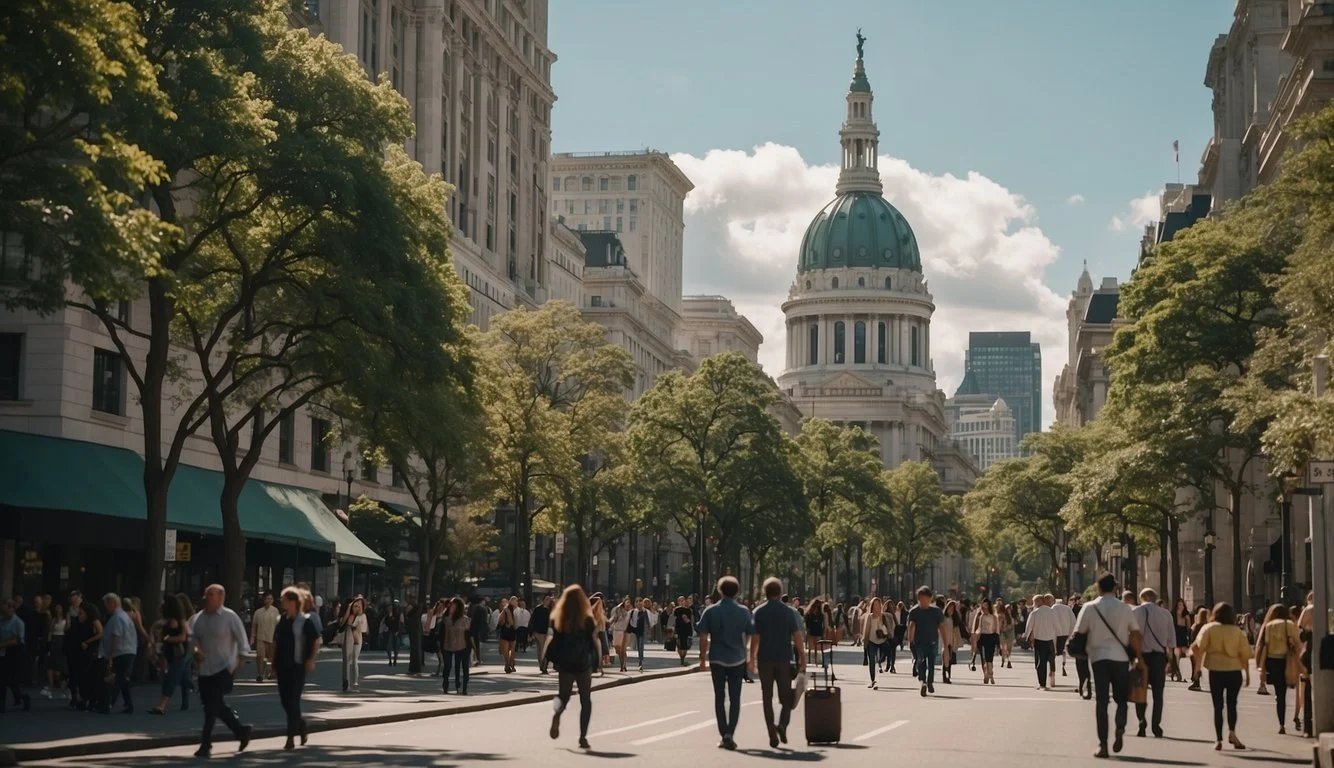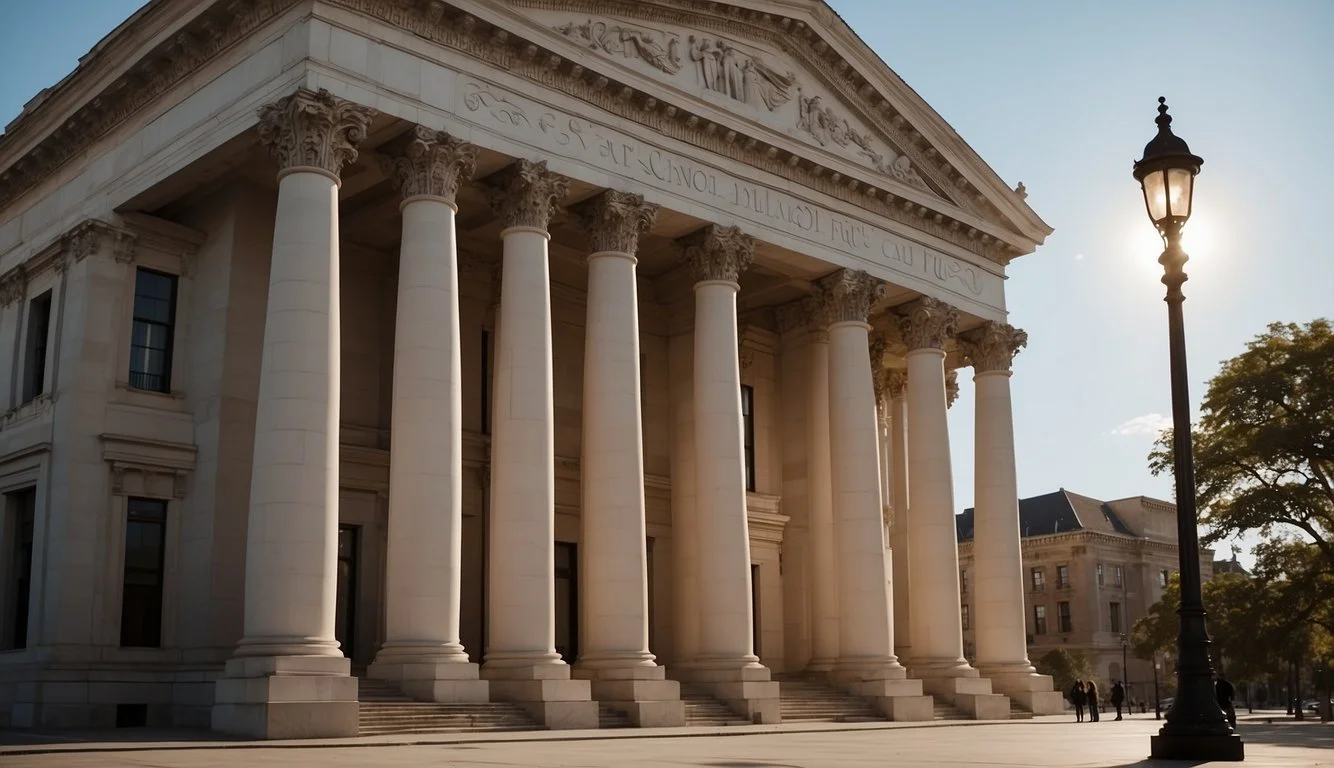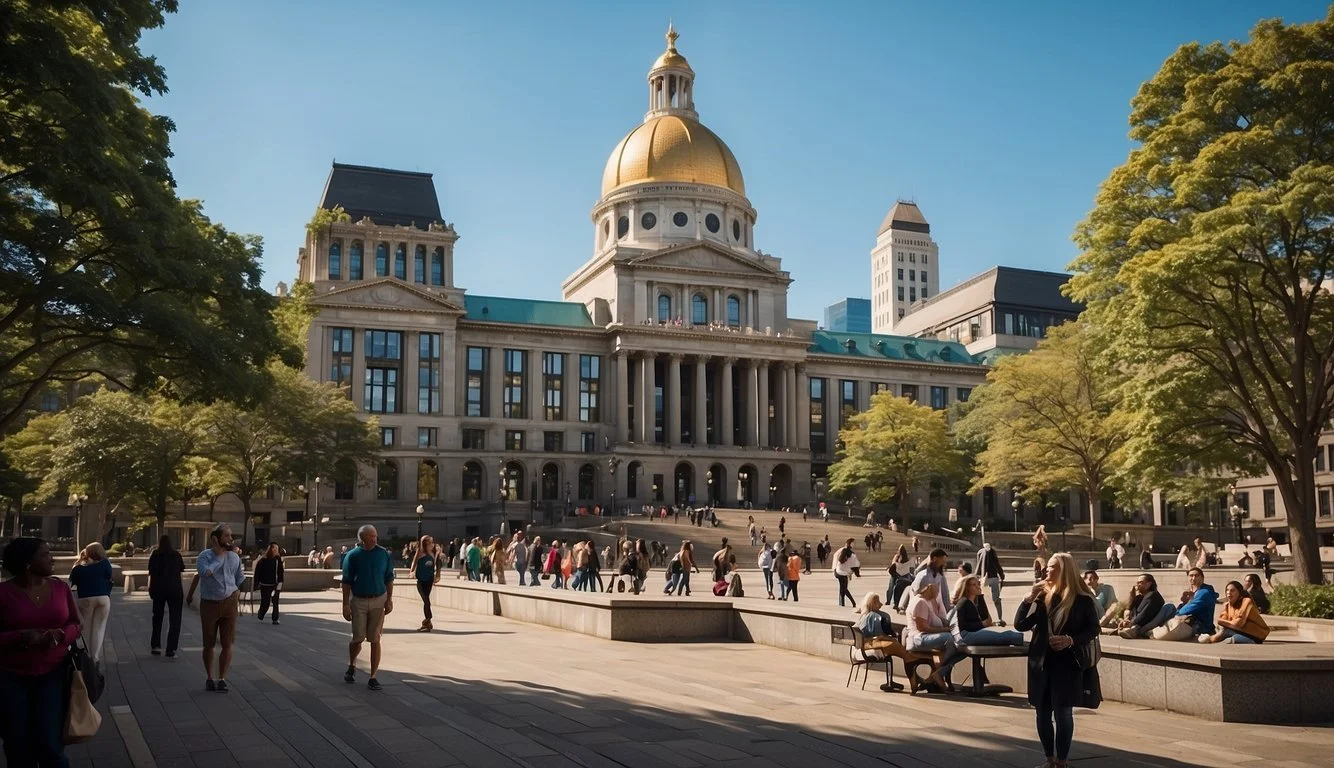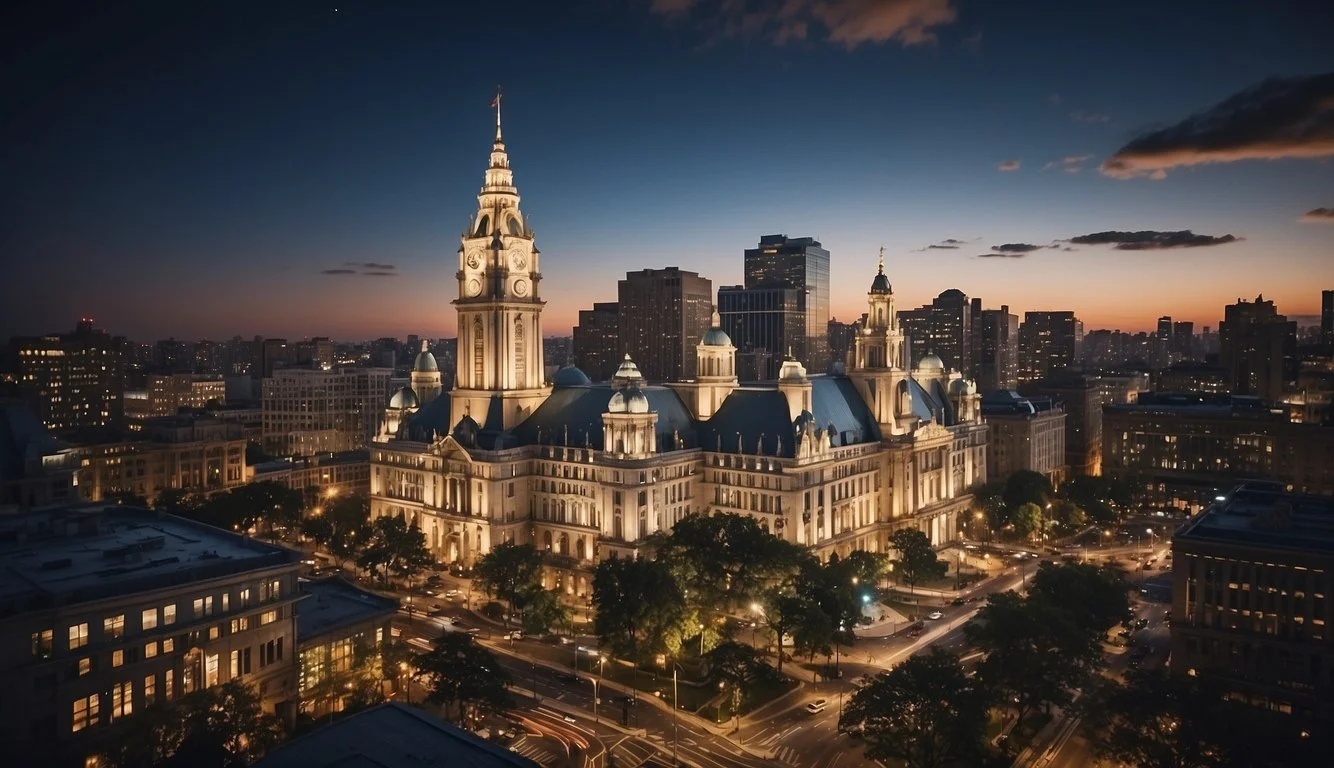Documentary Review: City Hall (2020)
A Detailed Examination of Civic Life
Frederick Wiseman's documentary City Hall (2020) offers an in-depth look into the daily operations of Boston's municipal government. Spanning an impressive 272 minutes, the film meticulously captures various aspects of city administration, highlighting how local governance impacts the community.
Wiseman brings his unique observational style to this documentary, focusing on the small, often overlooked moments that collectively shape public life. From city council meetings to public works operations, every scene reflects the intricacies of civic management.
While some may find the film's length daunting, its comprehensive approach provides a profound insight into how a city functions beyond headline news. This documentary is a tribute to the unseen efforts of those who keep Boston running efficiently, making it a must-watch for anyone interested in public administration and urban life.
Director's Profile: Frederick Wiseman
Frederick Wiseman, born January 1, 1930, is a prominent American filmmaker known for his immersive documentaries. Over his illustrious career, he has produced a vast array of films, focusing on various institutions and facets of society.
Early Life and Education
Wiseman was born in Boston, Massachusetts. He attended Williams College and later Yale Law School, where his initial studies laid a foundation for his analytical approach to filmmaking.
Career Highlights
His career in documentary filmmaking began with the influential 1967 film Titicut Follies, which examines the conditions inside a Massachusetts correctional facility for the criminally insane. This film set the tone for Wiseman's future works, emphasizing the observational style.
Style and Approach
Wiseman is known for his unique approach to documentary filmmaking, opting for an observational method without interviews or voiceovers. He allows the camera to capture the natural flow of life, giving audiences unfiltered access to the inner workings of various institutions.
Notable Works
Some of his significant works include:
High School (1968)
Hospital (1970)
Welfare (1975)
In Jackson Heights (2015)
His latest work, City Hall (2020), focuses on the day-to-day operations of Boston's City Hall, capturing the essence of public administration.
Accolades
Wiseman has received numerous awards throughout his career, including an honorary Academy Award in 2016. His work is celebrated for its depth, clarity, and commitment to portraying real-life complexities.
Across more than five decades, Frederick Wiseman has established himself as a master of documentary filmmaking, offering profound insights into the human condition through his lens.
Synopsis of 'City Hall'
Frederick Wiseman's documentary City Hall offers a comprehensive look at the inner workings of Boston's municipal government. Clocking in at 272 minutes, the film meticulously captures the day-to-day operations of various departments.
Wiseman follows Boston officials as they manage public services, from sanitation and veterans' affairs to community events and public hearings. The documentary highlights the diverse range of responsibilities that fall under city governance.
The film presents an unscripted and raw portrayal of civic life, emphasizing public employees' dedication. It shows real-life scenarios and decisions that impact Boston residents.
City Hall also reflects the broader social landscape, showcasing the participation of people of color in public jobs. This aspect underscores the evolving dynamics within the city's workforce.
Structured without narration or interviews, the documentary relies on observational sequences. Wiseman allows the actions and dialogues of city employees to tell the story.
In essence, City Hall serves as a detailed case study of how a major American city functions. It explores the complexities and challenges of urban governance in the 21st century.
Cinematic Techniques and Style
Frederick Wiseman's "City Hall" employs a fly-on-the-wall documentary technique that immerses the audience in the day-to-day operations of Boston's governance.
He avoids narration, allowing scenes to speak for themselves. This observational style captures genuine moments without director intervention, offering viewers an unfiltered look.
The film features long takes and minimal cuts, emphasizing the real-time flow of events. This technique mirrors the slow, deliberate nature of governmental processes.
Wiseman uses wide-angle shots to convey the scale of Boston City Hall and its bustling environment. Close-ups are rare but strategically used to highlight personal interactions and emotional moments.
Natural lighting dominates the film, enhancing the authenticity of each scene. By not manipulating lighting, Wiseman ensures a realistic portrayal.
Sound design relies heavily on diegetic sounds. Conversations, city noise, and office activities create a rich audio environment that grounds the viewer in the real world.
Throughout the 272-minute runtime, editing choices play a crucial role. The film cuts between various departments, meetings, and public events to build a comprehensive picture of city operations.
Color palettes are understated, reflecting the institutional settings. Muted tones of office furniture, walls, and attire reinforce the everyday nature of the subject matter.
Wiseman's restrained approach in "City Hall" is a testament to his belief in the power of unembellished reality. This deliberate simplicity invites viewers to form their own interpretations, making for a deeply engaging experience.
Themes and Motifs
Frederick Wiseman’s City Hall delves into the intricacies of Boston's local government, unveiling a series of recurring themes and motifs through meticulous observation.
Civic Engagement: The documentary emphasizes the role of civic engagement and community involvement. It presents the government as an entity interacting with citizens through meetings, public forums, and civic activities.
Transparency: Another central theme is transparency. Wiseman's unfiltered portrayal of governmental operations seeks to demystify the workings of City Hall, highlighting efforts to be open and accountable.
Diversity and Inclusion: The film also explores themes of diversity and inclusion. It shows various representatives and officials addressing issues relevant to different ethnic and socioeconomic groups, reflecting Boston's multicultural makeup.
Public Service: The dedication and diligence of public servants form a key motif. Viewers see various city employees working diligently across departments, underscoring the importance of their roles in maintaining the city's health and order.
Daily Operations: The everyday operations of City Hall are presented as an ecosystem, demonstrating how various departments function and coordinate to serve the community effectively.
Leadership: Leadership emerges as a subtle motif, particularly through the focus on Mayor Marty Walsh and his approach to governance. His interactions with staff and the public frame much of the narrative.
The themes in City Hall craft a comprehensive image of municipal governance, laying bare the complexities and significance of local government in a democratic society.
Analysis of Political Commentary
Frederick Wiseman’s City Hall offers an in-depth look at the inner workings of Boston’s municipal government. The documentary highlights the complexities and challenges of local governance, especially in a major city like Boston.
An interesting aspect is Wiseman's unfiltered portrayal of how city officials tackle social issues. By capturing candid conversations and meetings, the film underscores their commitment to addressing problems like housing, racial inequality, and public safety.
The lengthy runtime allows for a nuanced view of political processes. Viewers witness the intricate balance between bureaucracy and civic duty. Wiseman avoids sensationalism, instead presenting a realistic portrayal of how municipal policies are discussed and implemented.
Wiseman uses a fly-on-the-wall approach, eschewing interviews and commentary. This method immerses the audience in the day-to-day activities of Boston's City Hall, offering a genuine perspective on the political landscape.
Notably, City Hall opens a window into the diversity of voices involved in decision-making. From elected officials to community members, the documentary showcases a broad spectrum of participants in the democratic process.
Through meticulous observation, the film also illustrates the impact of local governance on ordinary citizens. Real-life implications of policies are depicted, making the abstract nature of governance more tangible.
The depiction of public meetings, inter-departmental interactions, and community outreach emphasizes transparency and accountability. City Hall portrays how important these elements are for building trust between the government and its constituents.
Overall, Wiseman’s documentary serves as a vital exploration of local politics. Through detailed examination, it offers an educational insight into the operational dynamics of a city hall and the politically charged environment within which it operates.
Representation of Boston's Community
Frederick Wiseman’s film, "City Hall," meticulously captures the essence of Boston's diverse community. Wiseman’s camera dives deep into the daily activities and operations of Boston City Hall, providing an authentic and raw portrayal of the community and its infrastructure.
The documentary features various city officials, including Mayor Marty Walsh, as they engage in policy-making and community discussions. These scenes underscore the collaborative spirit of Boston's governance and its ongoing efforts to address the needs of its residents.
Boston's cultural and ethnic diversity is prominently showcased in the film. Various public meetings and community events highlight voices from different backgrounds, reflecting the city's rich multicultural tapestry. Wiseman effectively presents these interactions, emphasizing the city's inclusive approach to civic engagement.
Economic disparities and social issues are not glossed over. The documentary includes scenes addressing housing, public safety, and social services. These elements present a candid look at the challenges faced by Boston's lower-income communities, offering viewers a comprehensive view of the societal dynamics in play.
Through unfiltered and extended footage, "City Hall" emphasizes the complex interplay between government institutions and the people they serve. The film’s observational style ensures that every segment contributes to a holistic representation of Boston's community, both in its struggles and its strengths.
Frederick Wiseman's sensitive and thorough approach highlights the multifaceted nature of Boston, creating a compelling narrative of a city continuously evolving through its community’s efforts and challenges.
Comparison to Other Documentary Works
Frederick Wiseman's City Hall is often compared to his earlier works like Titicut Follies and High School. Though both films explore institutional frameworks, City Hall is distinct in its focus on the complexities of municipal governance.
Unlike Titicut Follies, which delves into the harsh realities of a state prison for the criminally insane, City Hall presents a more optimistic view. It highlights the daily operations and civic engagement essential to Boston's city government.
Film Length Comparison:
Documentary Length Titicut Follies 84 minutes City Hall 272 minutes High School 75 minutes
The length of City Hall, at 272 minutes, places it among Wiseman's longer works, more akin to his comprehensive look at institutional life in At Berkeley (244 minutes). The extensive runtime allows for a thorough examination of Boston's city government, unlike shorter documentaries which may offer a more cursory view.
Themes Explored:
Titicut Follies: Institutional abuse, mental health.
High School: Education, adolescence.
City Hall: Civic engagement, public administration.
Wiseman's observational style remains consistent. However, City Hall differs by undertaking a more multifaceted depiction of its subject. This approach contrasts with the more singular focus seen in works like Hospital which zeroes in on the medical world.
Genre Versatility:
Wiseman's versatility in documentary filmmaking is evident as he transitions from the restrained environs of a high school (High School) to the bustling atmosphere of Boston's city hall (City Hall). Each documentary is tailored to its subject's unique setting, proving Wiseman’s skill in capturing diverse societal aspects.
Overall, while City Hall maintains Wiseman's characteristic depth, its focus on civic functionality sets it apart from his prior documentaries primarily centered on more isolated institutional environments.
Critical Reception and Reviews
City Hall directed by Frederick Wiseman, has garnered attention for its extensive and immersive exploration of Boston's civic operations.
Roger Ebert's website highlights that the documentary, with its 272-minute runtime, delves deeply into the city's day-to-day functions, capturing a unique perspective of Boston from late 2018 through early 2019.
Variety elaborates on the film's production, noting its presentation by Zipporah Films and release in association with PBS, ITVS, and WGBH. The review mentions the lengthy runtime of 275 minutes, emphasizing the documentary's expansive scope.
IndieWire emphasizes Wiseman's long-standing dedication to chronicling social institutions since 1967. The review lauds his ability to create compelling narratives out of seemingly mundane activities, indicating the film's ambitious nature.
NPR describes the documentary as a pre-COVID-19 time capsule. The review acknowledges the film's ability to capture a moment in time, highlighting Wiseman's meticulous attention to detail.
Frederick Wiseman's extensive body of work is consistently praised, with City Hall being recognized as a substantial addition to his filmography. Reviewers commend his ability to offer a profound look into the intricacies of local government.
Impact and Relevance
"City Hall" (2020) by Frederick Wiseman offers a detailed observation of the administrative functions of Boston. Filmed over 2018 and 2019, it captures a pre-pandemic world. This aspect makes the film an intriguing time capsule of municipal operation before the COVID-19 crisis.
Wiseman's approach showcases the inner workings of various city departments. Through methodical documentation, it reveals the intricacies of local government. The film provides viewers with a comprehensive look at civic engagement and public service.
The documentary has significant educational value. It illustrates governmental transparency and public sector challenges. This serves as an essential resource for students, policymakers, and anyone interested in civic administration.
"City Hall" emphasizes the importance of community and the responsibilities of elected officials. The ordinary, day-to-day activities of the city government are put into focus. This highlights how these operations affect citizens' lives.
The film's length, over four hours, allows for an immersive experience. Despite this, the narrative remains engaging, maintaining a steady pace. It mirrors the continuous and often unseen effort required to keep a city functioning.
Frederick Wiseman's reputation as a documentary filmmaker adds weight to the film. His significant body of work, since "Titicut Follies" (1967), enhances the credibility and interest in "City Hall."









